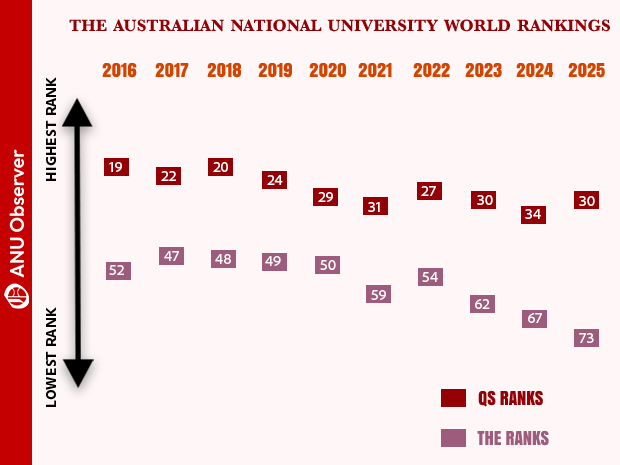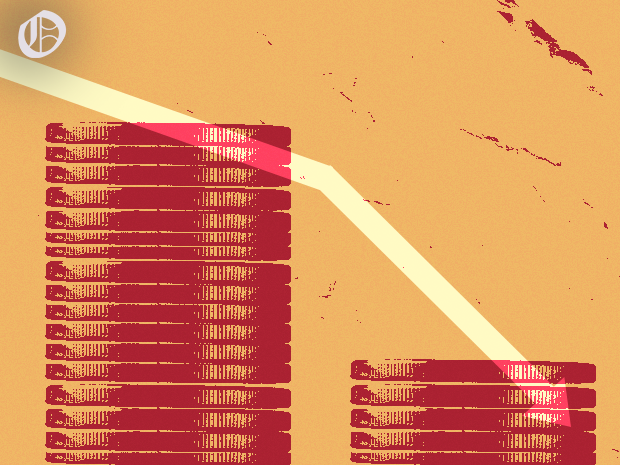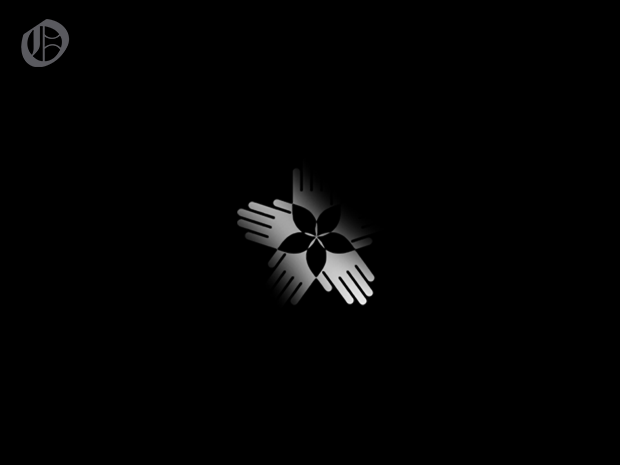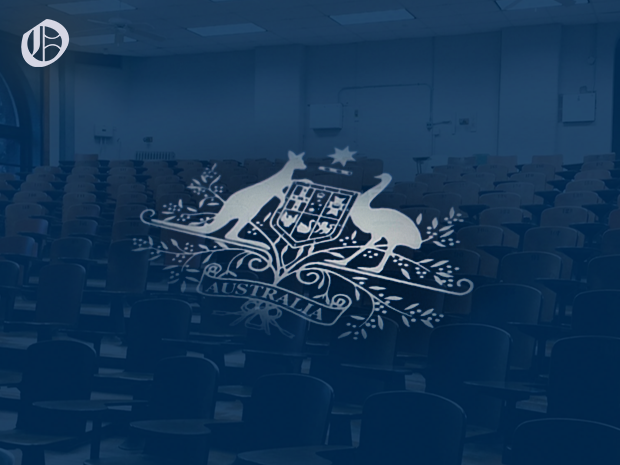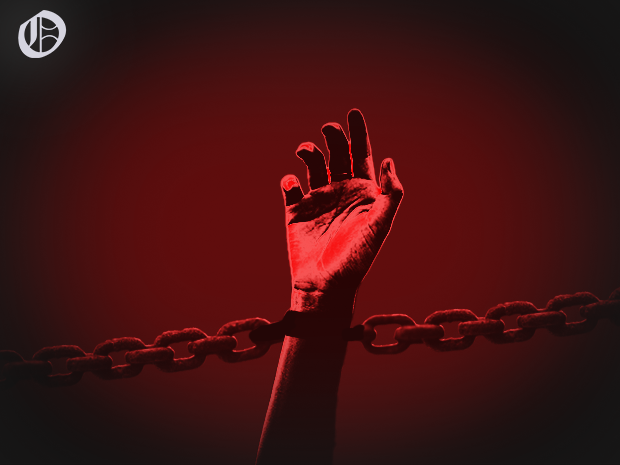Four Candidates Contest Queer* Officer Election
Eliza Croft & Michael Turvey
The election for Queer* Officer will have four names on the ballot; the first contested election in several years. Matthew Mottola, Swagata Ghosal, Celeste Sandstrom, and Sumi Venketasubramanian have announced their intention to run.
What does the Queer* Officer do?
The Queer* Department, like other ANUSA Departments, is an autonomous group that supports and advocates for traditionally marginalised groups – in this case, queer* students. The Officer runs the departments, including events and campaigns. They also provide pastoral care to queer* students. The Officer also sits on many University committees, to advocate for Queer* students to ANU executives.
The Officer and deputies split $15,000 in honoraria. Many departments select their Officer candidate at autonomous meetings, but in the Queer* Department a formal, balloted election is possible. Despite this, it’s common for only one candidate to run, and the last contested election was in 2015.
Who are the candidates, and what experience do they have?
Matthew Mottola
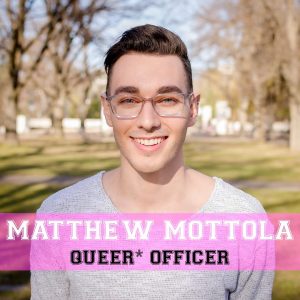 Matthew is currently one of the Deputy Queer* Officers. He is currently Branch Officer for the Advocacy, Humanitarian and Social Justice Branch on the Clubs Council, and an organiser of the upcoming Pride Week. He also has experience as a Senior Resident and Queer* Representative at UniLodge.
Matthew is currently one of the Deputy Queer* Officers. He is currently Branch Officer for the Advocacy, Humanitarian and Social Justice Branch on the Clubs Council, and an organiser of the upcoming Pride Week. He also has experience as a Senior Resident and Queer* Representative at UniLodge.
Swagata Ghosal
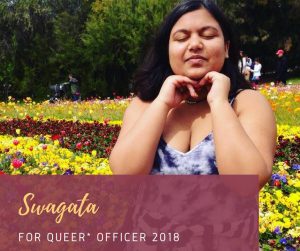 Swagata is currently the Social Media Officer for the ANU Women’s Department. She also helped organise the inaugural Ethnocultural week in May of this year.
Swagata is currently the Social Media Officer for the ANU Women’s Department. She also helped organise the inaugural Ethnocultural week in May of this year.
Celeste Sandstrom
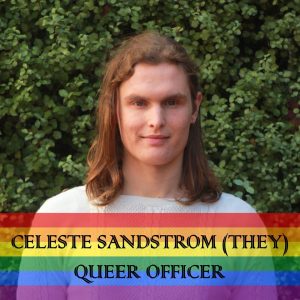 Celeste was a delegate for ANU to Queer* Collaborations 2017, a conference which brings together representatives from queer* collectives at Australian universities. They are also treasurer for the Australian Queer* Students Network.
Celeste was a delegate for ANU to Queer* Collaborations 2017, a conference which brings together representatives from queer* collectives at Australian universities. They are also treasurer for the Australian Queer* Students Network.
Sumithri Venketasubramanian
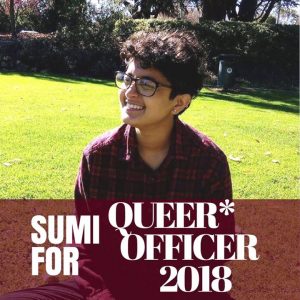 Sumi was a delegate to Queer* Collaborations 2017, where she helped draft a statement from Queer People of Colour. Sumi is also a Gender and Sexuality Advocate at Burton and Garran Hall, and frequently contributes to on issues of social justice, race and identity, including her show Oh, but where are you really from?
Sumi was a delegate to Queer* Collaborations 2017, where she helped draft a statement from Queer People of Colour. Sumi is also a Gender and Sexuality Advocate at Burton and Garran Hall, and frequently contributes to on issues of social justice, race and identity, including her show Oh, but where are you really from?
What would they do as Officer?
Inclusivity and Intersectionality in the Department
All candidates would like to see the Queer* Department become more inclusive. While all value intersectionality (that is, considering how different forms of disadvantage and oppression interact), they each have particular areas of focus.
Celeste said they “wish to promote…marginalised voices in the queer* community, including asexual and aromantic spectrum and TISGD [trans, intersex, and gender diverse] voices”. They particularly wished for these perspectives to be heard “outside of the context of queer* discussions”.
Sumi “would like to open up the Queer* Department to be more welcoming to queer* students of colour in particular”, saying, “in my experience the [Queer* Department] space feels quite white.” Swagata appears to feel similarly, telling Observer that the Queer* Department can “sometimes feel very hostile to queer* and non-binary people of colour”. Swagata also placed focus on the experiences of women- and femme-identifying queer* students, and claimed the queer* community can be “misogynistic”.
Matthew similarly emphasised the importance of “representation of minority communities”, saying, “the more intersectional a department/executive, the stronger it is.” However, he also told Observer he wants to move away from “negatively charged identity based politics” and making students feel “not queer enough” to be involved in the Department. “My lived experience [as a cisgender white man] doesn’t preclude me from advocating for others,” he argued.
Campaigns
Sumi wants to see “increased intersectionality in the campaigns” of all Departments, wanting to collaborate with them to ensure that queer* experiences are represented.
Celeste has promised to “make known the Department’s positions on various issues”, and like Sumi, ensure queer* perspectives are understood in other Departments. They also want to “work with halls [of residence] to promote and normalise talking about queer* issues”, citing their experience as a campus resident.
Structural Change and Role in ANUSA
Matthew is so far the only candidate to announce plans for changing the Department’s structure. He has promised “executive overhaul”, with the creation of a Secretary, Social Officer, and Education Officer. Matthew also discussed the importance of the Queer* Officer as a member of the SRC, saying it is important they “read and scrutinise reports, ask questions of members, and actively uphold the functions of SRC”.
Concerns for autonomy in the election.
When voting, students will be asked to vote for the Queer* Officer only if they identify as queer*. As voting is anonymous, however, there are concerns about autonomy (that is, the concept of only queer* students participating).
Celeste told Observer that while having a general election could compromise autonomy, “Queer* Department meetings can be inaccessible to queer*-identifying students for a variety of reasons, and as such represent a smaller sample of the queer* students on campus”. Sumi and Matthew echoed this concern for queer* students who do not attend Department meetings. “Personally, I weigh accessibility and accountability over a small percentage of voters who may break autonomy,” Matthew said.
Nominations for all positions closed today, with elections to occur in Week 5.
Update: Included Sumi’s Woroni publications on social justice issues and identity under her relevant experience.
Note on style: In this article Observer chose to break from our style guide and refer to individuals by their first names. This was done to ensure accessibility as many queer* individuals, having changed or chosen their name, may feel most comfortable referred to on a first-name basis.
